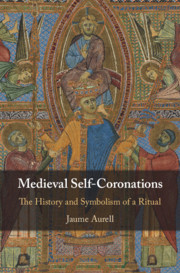Book contents
- Medieval Self-Coronations
- Medieval Self-Coronations
- Copyright page
- Contents
- Figures
- Acknowledgements
- Introduction
- 1 Self-Coronation As Ritual
- Part I Heritage
- Part II Infamy
- Part III Convention
- 9 Alfonso XI of Castile
- 10 Peter IV of Aragon’s Self-Coronation
- 11 Charles III of Navarra
- 12 Early Modern Dramatisation
- Conclusion
- Index
Conclusion
from Part III - Convention
Published online by Cambridge University Press: 20 May 2020
- Medieval Self-Coronations
- Medieval Self-Coronations
- Copyright page
- Contents
- Figures
- Acknowledgements
- Introduction
- 1 Self-Coronation As Ritual
- Part I Heritage
- Part II Infamy
- Part III Convention
- 9 Alfonso XI of Castile
- 10 Peter IV of Aragon’s Self-Coronation
- 11 Charles III of Navarra
- 12 Early Modern Dramatisation
- Conclusion
- Index
Summary
Based on the inductive analysis of the previous chapters of the book, the conclusion provides closing remarks on the historical, political, social, religious and symbolic meanings of the practice of self-coronation among medieval kings, using a long-term approach. From a political point of view, self-coronations are proofs of the activation of individual agency rather than the stability of established structures in the Middle Ages. This ritual demystifies certain anthropological tendencies to constrain the rites to the boundaries of their particular context or to fix them in an essentialist symbolic meaning. From a social perspective, medieval self-coronations pushed for collective innovation and dynamism. These rituals were in a perpetual state of flux, confirming anthropologists’ belief that ritual symbols are not static, absolute objectifications, but social and cultural systems, gathering meaning over time and altering in form. This contextualised approach to the seminal concept of the ‘sacred’ and the ‘secular’ requires us to revise a vision of the past altered by the lens of the modern nation-state and modern rationalism. Some of its qualities may be projected onto the present. The king’s skill in avoiding ecclesiastical mediation may help to explain the frontiers and limits between the temporal and spiritual, between politics and religion, which is essential for the stability of modern societies. In the end, the analysis and interpretation of self-coronations lead us to debunk the myth or grand narrative of the process of secularisation.
Keywords
- Type
- Chapter
- Information
- Medieval Self-CoronationsThe History and Symbolism of a Ritual, pp. 302 - 317Publisher: Cambridge University PressPrint publication year: 2020

